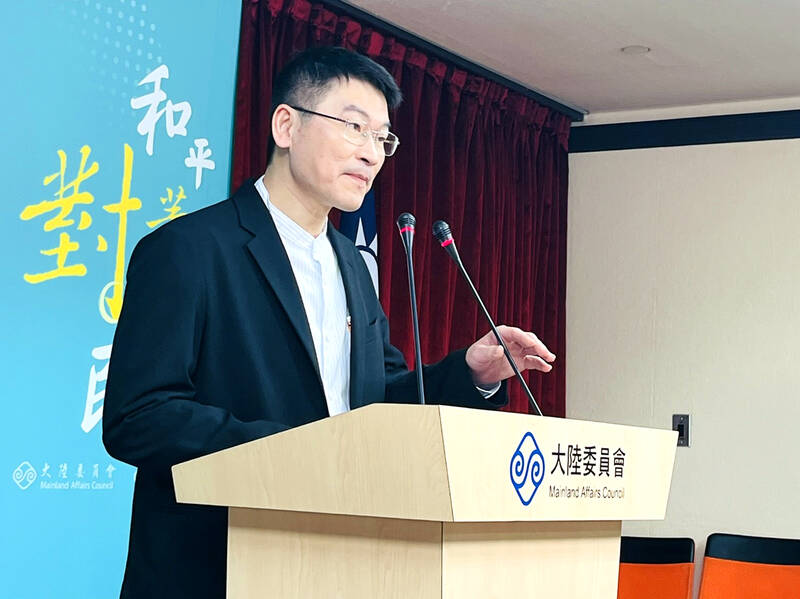The Mainland Affairs Council (MAC) yesterday said it would amend the Act Governing Relations Between the People of the Taiwan Area and the Mainland Area (臺灣地區與大陸地區人民關係條例) to deal with the issue of Taiwanese citizens holding Chinese residency permits.
China has used these residency permits to muddle the issue of national identity on either side of the Taiwan Strait and as a tool for integration, the council said in a written statement.
The Chinese Communist Party has used Taiwanese entities to promote these residency cards and other Chinese identity documents, it said.

Photo: Chen Yu-fu, Taipei Times
The statement was in response to remarks earlier yesterday by China’s Taiwan Affairs Office spokesperson Zhu Fenglian (朱鳳蓮), who said that “Democratic Progressive Party [DPP] officials” are responsible for the confusion about China’s residency card and Taiwanese compatriot card.
DPP officials have done this to disrupt, Zhu said at a news conference in Beijing, alleging that the Taiwanese government seeks to threaten and intimidate Taiwanese.
Taiwanese have been allowed to apply for China’s residency permits since 2018, Mainland Affairs Council Deputy Minister and spokesman Liang Wen-chieh (梁文傑) told a news conference on Thursday last week.
Although there are conditions for applying for such a permit, such as residing in China for at least half a year or being gainfully employed, the Chinese government has loosened restrictions to attract more interest, Liang said.
The government needs to respond to this, he added.

CHANGING LANDSCAPE: Many of the part-time programs for educators were no longer needed, as many teachers obtain a graduate degree before joining the workforce, experts said Taiwanese universities this year canceled 86 programs, Ministry of Education data showed, with educators attributing the closures to the nation’s low birthrate as well as shifting trends. Fifty-three of the shuttered programs were part-time postgraduate degree programs, about 62 percent of the total, the most in the past five years, the data showed. National Taiwan Normal University (NTNU) discontinued the most part-time master’s programs, at 16: chemistry, life science, earth science, physics, fine arts, music, special education, health promotion and health education, educational psychology and counseling, education, design, Chinese as a second language, library and information sciences, mechatronics engineering, history, physical education

The High Prosecutors’ Office yesterday withdrew an appeal against the acquittal of a former bank manager 22 years after his death, marking Taiwan’s first instance of prosecutors rendering posthumous justice to a wrongfully convicted defendant. Chu Ching-en (諸慶恩) — formerly a manager at the Taipei branch of BNP Paribas — was in 1999 accused by Weng Mao-chung (翁茂鍾), then-president of Chia Her Industrial Co, of forging a request for a fixed deposit of US$10 million by I-Hwa Industrial Co, a subsidiary of Chia Her, which was used as collateral. Chu was ruled not guilty in the first trial, but was found guilty

Taiwan-based publisher Li Yanhe (李延賀) has been sentenced to three years in prison, fined 50,000 yuan (US$6,890) in personal assets and deprived political rights for one year for “inciting secession” in China, China's Taiwan Affairs Office spokesman Chen Binhua (陳斌華) said today. The Shanghai First Intermediate People’s Court announced the verdict on Feb. 17, Chen said. The trial was conducted lawfully, and in an open and fair manner, he said, adding that the verdict has since come into legal effect. The defendant reportedly admitted guilt and would appeal within the statutory appeal period, he said, adding that the defendant and his family have

DEADLOCK: As the commission is unable to forum a quorum to review license renewal applications, the channel operators are not at fault and can air past their license date The National Communications Commission (NCC) yesterday said that the Public Television Service (PTS) and 36 other television and radio broadcasters could continue airing, despite the commission’s inability to meet a quorum to review their license renewal applications. The licenses of PTS and the other channels are set to expire between this month and June. The National Communications Commission Organization Act (國家通訊傳播委員會組織法) stipulates that the commission must meet the mandated quorum of four to hold a valid meeting. The seven-member commission currently has only three commissioners. “We have informed the channel operators of the progress we have made in reviewing their license renewal applications, and